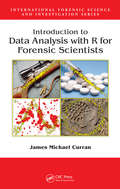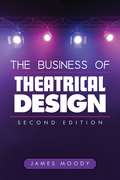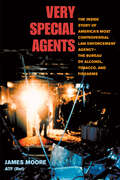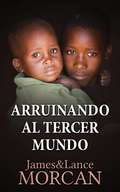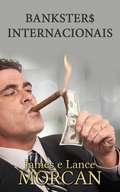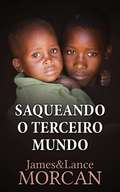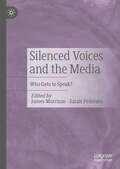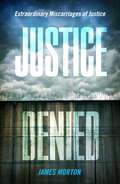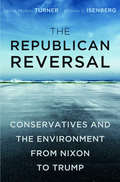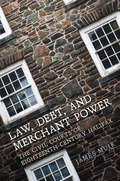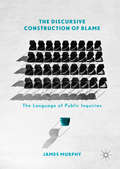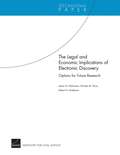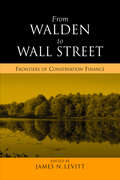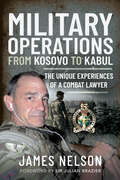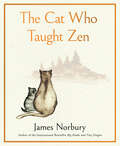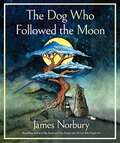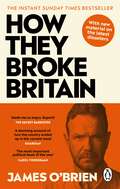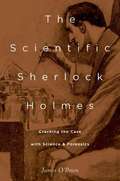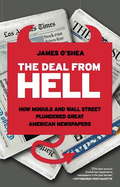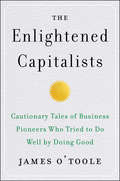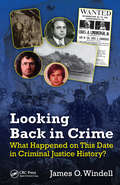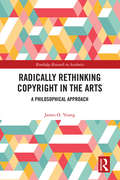- Table View
- List View
Introduction to Data Analysis with R for Forensic Scientists (International Forensic Science and Investigation)
by James Michael CurranStatistical methods provide a logical, coherent framework in which data from experimental science can be analyzed. However, many researchers lack the statistical skills or resources that would allow them to explore their data to its full potential. Introduction to Data Analysis with R for Forensic Sciences minimizes theory and mathematics and focus
The Business of Theatrical Design, Second Edition
by James MoodyWritten by a leading design consultant and carefully updated with the latest information on the industry, this is the essential guide to earning a living, marketing skills, furthering a design career, and operating a business. With more than thirty years of backstage and behind-the-scenes experience in theater, film, television, concerts, and special events, James Moody shares his success secrets for the benefit of design students and working designers. Topics include: Finding and landing dream assignmentsNegotiating feesSetting up ideal working spacesBuilding the perfect staffOvercoming fears of accounting and record-keepingChoosing the right insuranceJoining the right unions and professional organizationsAnd more In addition to revealing how to get the great design jobs in traditional entertainment venues, the author shows designers how to think outside the box and seize creative, lucrative opportunities—such as those in theme parks, in concert halls, and with architectural firms. Providing the keys for passionate, talented designers to become successful businesspeople, The Business of Theatrical Design is a must-read for novices and established professionals alike.
Very Special Agents: The Inside Story of America's Most Controversial Law Enforcement Agency--The Bureau of Alcohol, Tobacco, and Firearms
by James MooreWhen James Moore joined the ATF in 1960, it was an arm of the Internal Revenue Service with one job: to catch the Mafia bootleggers whose distilleries cheated Uncle Sam of millions in tax revenue. During his twenty-five years of service, Moore saw the organization shift to enforcing of gun laws, be reborn as a separate bureau, and take on bombings and arson cases that most law officers wrote off as impossible to solve. Moore's personal, from-the-hip history spans the long-running war against dons and drug dealers and covers agents' daring infiltration of the Ku Klux Klan, Hell's Angels, and other violent groups. He reveals the cutting-edge forensics work that helped crack the World Trade Center and Oklahoma City bombings and also provides an insider account of the raid on the Branch Davidians at Waco. Finally, Moore discusses the ATF's rivalry with the FBI and the political power games that impede the government's ability to fight crime.
Arruinando al Tercer Mundo
by Marcela Gutiérrez Bravo y Luis Arturo Sánchez James Morcan Lance Morcan"Arruinando al Tercer Mundo" está dedicado a los pobres en lugares olvidados del mundo. Cuestiona si instituciones como el Banco Mundial, el Fondo Monetario Internacional, la Agencia de los Estados Unidos para el Desarrollo Internacional y otras grandes organizaciones de ayuda internacional en verdad rescatan o hunden a la gente más pobre del mundo. Este libro también cuestiona si la ayuda provista es genuina o si se trata de una estafa diseñada para subyugar a los países del Tercer Mundo. Expone la cultura de la corrupción dentro de las mencionadas organizaciones de ayuda y la arrogancia con que tratan a sus “clientes” del tercer mundo. Los Morcan revelan que hay una agenda oculta y vil en juego, donde la “generosidad” extendida por organizaciones de ayuda internacional para asistir al desarrollo del Tercer Mundo y proveer alivio en la eventualidad de desastres naturales no sea caridad, sino egoísmo, con varios hilos atados... hilos diseñados para esquilar naciones vulnerables. El lector encontrará al popular Sicario Económico John Perkins y encontrará que su bestseller “Confesiones de un Sicario Económico” es vigente, particularmente en África. Al escribir este libro, los autores fueron motivados por unas estadísticas escalofriantes: 21,000 personas mueres de hambre cada día. ¡Eso es una persona cada cuatro segundos! Más escalofriante es el hecho de que tales muertes son innecesarias, dado que hay más que suficiente riqueza en el mundo para que todos cubran, al menos, las necesidades básicas de la vida, y más que el Tercer Mundo se sostenga orgánicamente a sí mismo. Para cuando termines este libro, verás que hay tanta riqueza en el Tercer Mundo, como en el Primero. De hecho, términos como “Tercer Mundo” y “naciones pobres” están, esencialmente, equivocados, ya que implican que la riqueza y los recursos son limitados en estos lugares.
Bankster$ Internacionais
by James Morcan Lance Morcan Wesley LindquistBankster$ Internacionais identifica quem são os responsáveis pelos gigantescos golpes financeiros que separam os 1% superiores da população, quanto à renda, das pessoas comuns, ou os 99%. Os Barões do Dinheiro focalizados neste livro incluem os administradores dos mais altos níveis nos bancos de Wall Street, nos bancos centrais europeus, na Reserva Federal dos EUA e no Banco do Vaticano, bem como os membros das dinastias bancárias de elite, por exemplo as famílias Rothschild e Rockefeller. Bankster$ Internacionais revela os verdadeiros motivos da série de crises financeiras recentes. Esses motivos incluem: o mundo secreto do "black money" e do dinheiro do Velho Mundo onde a maioria dos ativos e renda permanece não declarada; o sistema dos bancos centrais e a verdadeira natureza da Reserva Federal, dos EUA; as atividades financeiras menos do que santas do Vaticano; as relações nem sempre benevolentes do FMI e do Banco Mundial com os países do Terceiro Mundo; as medidas de austeridade atualmente infligidas a nações vulneráveis como a Grécia; bem como a teoria de que o suprimento de dinheiro do mundo está essencialmente sendo criado do nada. Além de identificar problemas e expor a corrupção, Bankster$ Internacionais propõe ideias para criar um sistema econômico mais justo. Essas idéias incluem: criar bancos públicos; utilizar certos aspectos da banca islâmica que podem ser compatíveis com os sistemas bancários ocidentais; estudar se o capitalismo e o socialismo podem realmente funcionar em conjunto; discutir o caso de manter, mas reestruturar o capitalismo; considerar os méritos de uma renda universal; e prever a influência do ciber-dinheiro, ou criptomoedas, na economia mundial nos próximos anos. Embora os assuntos abordados possam ser problemas monetários, isso está na superfície ...
Gangsters Bancario$ Internacionales
by Juliana Arango James Morcan Lance MorcanDescripción del libro: ¿Quieres saber quién se encuentra manipulando ahora mismo los mercados financieros en secreto? ¡Entonces síguele el rastro al dinero! Gángster$ Bancario$ Internacionales identifica a los responsables de la enorme brecha financiera que separa al 1% de la población del resto del común de las personas, que representan el 99%. Entre los amos financieros que se ponen al descubierto en este libro se incluyen personas influyentes en los bancos de Wallstreet, en los bancos centrales europeos, en la Reserva Federal de los EE. UU., y en el Banco del Vaticano, así como en dinastías bancarias como las familias Rothschild y Rockefeller. Gángster$ Bancario$ Internacionales revela las verdaderas razones que llevaron a la oleada de crisis financieras recientes. Tales razones incluyen: el mundo secreto del “dinero negro” y el dinero del Viejo Mundo, cuyos mayores activos e ingresos permanecen sin ser declarados; el Sistema bancario central y la verdadera naturaleza de la Reserva Federal; las actividades financieras no tan santas del Vaticano; el FMI y el Banco Mundial y sus poco caritativos acuerdos con el Tercer Mundo; las medidas de austeridad que en la actualidad están siendo aplicadas sobre naciones vulnerables como Grecia; así como la teoría según la cual el suministro mundial de dinero proviene esencialmente de la nada. Más allá de identificar los problemas y de poner al descubierto la corrupción, Gángster$ Bancario$ Internacionales propone ideas para la creación de un sistema económico más justo. Estas ideas incluyen: bancos de propiedad pública; algunos aspectos típicos de la banca islámica que podrían resultar compatibles con los sistemas bancarios de Occidente; explorar si el capitalismo y el socialismo pueden de hecho funcionar en conjunto; abogar por mantener un capitalismo reestructurado; considerar los méritos de la existencia de un ingreso universal; y predecir las form
Saqueando o Terceiro Mundo: Como a Elite Global Afundou as Nações Pobres num Mar de Débitos
by Makoto Yamamoto James Morcan Lance MorcanSaqueando o Terceiro Mundo é dedicado aos empobrecidos nos lugares esquecidos de todo o mundo. O livro questiona se instituições como o Banco Mundial, o Fundo Monetário Internacional, a Agência dos Estados Unidos para o Desenvolvimento Internacional e outras grandes organizações de ajuda internacional mais ajudam do que prejudicam as pessoas mais pobres do mundo. Este livro analisa também se os pacotes de auxílio por essas organizações são genuínos ou se são golpes destinados a subjugar os países do Terceiro Mundo. Ele expõe a cultura da corrupção dentro das organizações mencionadas e a arrogância com que elas tratam os seus ‘clientes’ – os países subdesenvolvidos. Os Morcan revelam um plano nefasto correndo em segredo, em que a ‘generosidade’ oferecida pelas organizações de ajuda internacional em prol do desenvolvimento e do auxílio, do caso dos desastres naturais, vem com sérias condicionantes. Seriam elas amarras planejadas para extorquir as nações mais vulneráveis? O leitor também será lembrado de que os assassinos econômicos, popularizados no best-seller Confissões de um Assassino Econômico, de John Perkins, ainda estão vivos e na ativa – principalmente na África. Os autores foram motivados por uma incômoda estatística: 21 mil pessoas morrem de fome todos os dias. É uma pessoa a cada quatro segundos! Mais repugnante é o fato de que essas mortes são desnecessárias, dado que há riqueza mais do que suficiente no mundo inteiro para que todos os países tenham pelo menos as necessidades básicas supridas, e mais do que suficiente para que o Terceiro Mundo se sustente organicamente. Ao chegar ao fim do livro, você verá que há tanta riqueza no Terceiro Mundo quanto no Primeiro. Na verdade, termos como ‘Terceiro Mundo’ e ‘nações empobrecidas’ são essencialmente errôneas, pois implicam que a riqueza e os recursos são limitados nesses lugar
Silenced Voices and the Media: Who Gets to Speak?
by James Morrison Sarah PedersenThis edited collection delves into the multifaceted theme of 'Silenced Voices,' showcasing a diverse array of perspectives from scholars around the globe. From historical reflections to contemporary analyses, the book examines the complex dynamics of voice suppression and enablement across different media landscapes. Divided into four thematic sections, the chapters explore the challenges faced by marginalized and mainstream voices alike. From the portrayal of silenced narratives in the news media to the representation of underrepresented groups in cultural production, the collection spans a wide spectrum of issues. Authors employ varied methodological approaches to investigate the silencing of voices in the realms of politics, society, and professional media practices. Offering fresh insights and critical reflections, this volume serves as a timely contribution to ongoing debates surrounding freedom of expression, fake news, and the complexities of contemporary media environments.
Justice Denied: Extraordinary miscarriages of justice
by James MortonAn incisive examination by the bestselling author of The Mammoth Book of Gangs of some of the many miscarriages of justice of this and the previous century, which have seen innocent men and women found guilty, and sometimes executed. This shocking 'manual of injustice' exposes wrongful convictions and acquittals as a result of the chicanery of some forensic scientists, over-zealous or negligent police officers under pressure to get results, incompetent lawyers, lying witnesses, bribed juries, judicial blunders and feeble politicians. Sometimes, however, it is truculent and uncooperative defendants who prove their own worst enemies. It shows the mistakes that can be made in the face of a baying public and a rabid press, mistakes which have seen innocent men and women found guilty, and sometimes executed, while others have served lengthy sentences. It reveals critical flaws in criminal justice systems throughout the world (it is estimated, for example, that two per cent of felony cases in America result in wrongful convictions). Morton explores folk devils and moral panics, both historical such as the 'witches' of Salem and and much more recent cases like that of the West Memphis Three. It considers cases of race hatred, the impact of DNA, fit-ups, fake 'experts', doubtful science and the long road to the court of appeal. He also looks at what happens to the victims of miscarriages of justice, whether they go on to prosper or, as is sadly so often the case, never really recover. How did the boxer Rubin 'The Hurricane' Carter come to be wrongly convicted of a triple homicide? The alibi of Joe Hill, the Industrial Workers of the World activist wrongly executed for the murder of a Utah grocer and his son, came too late to save him from execution. On the other hand, Lindy Chamberlain (famously portrayed by Meryl Streep in A Cry in the Dark), has finally, over thirty years after the fact, had her claim that her baby Azaria was taken by a dingo at Ayers Rock in the Australian Outback upheld by a coroner. Among many other cases, Morton also considers the 1910 case of two men convicted of the murder of a man still alive in 1926, and case of the West Memphis Three, who were convicted as teenagers in 1994 of the murders of three boys in Arkansas and released in 2011 in a plea bargain after eighteen years, though the prosecution still refuses to accept their innocence.
The Republican Reversal: Conservatives and the Environment from Nixon to Trump
by James Morton TurnerNot long ago Republicans took pride in their tradition of environmental leadership. The GOP helped create the EPA, extend the Clean Air Act, and protect endangered species. Today Republicans denounce climate change as a “hoax” and seek to dismantle environmental regulations. What happened? James Morton Turner and Andrew C. Isenberg provide answers.
Law, Debt, and Merchant Power: The Civil Courts of 18th Century Halifax
by The Osgoode Society James MuirIn the early history of Halifax (1749-1766), debt litigation was extremely common. People from all classes frequently used litigation and its use in private matters was higher than almost all places in the British Empire in the 18th century. In Law, Debt, and Merchant Power, James Muir offers an extensive analysis of the civil cases of the time as well as the reasons behind their frequency. Muir's lively and detailed account of the individuals involved in litigation reveals a paradoxical society where debtors were also debt-collectors. Law, Debt, and Merchant Power demonstrates how important the law was for people in their business affairs and how they shaped it for their own ends.
The Discursive Construction of Blame: The Language of Public Inquiries
by James MurphyThis book examines the language of public inquiries to reveal how blame is assigned, avoided, negotiated and discussed in this quasi-legal setting. In doing so, the author adds a much-needed linguistic perspective to the study of blame – previously the reserve of moral philosophers, sociologists and psychologists – at a time when public inquiries are being convened with increasing frequency. While the stated purpose of a public inquiry is rarely to apportion blame, this work reveals how blame is nevertheless woven into the fabric of the activity and how it is constructed by the language of the participants. Its chapters systematically analyse the establishment of inquiries, their questioning patterns, how blame can be avoided by witnesses, how blame is assigned or not by an inquiry’s panel and how such blame may result in public apologies. The author concludes with an engaging discussion on the value of public inquiries in civic life and suggestions for changes to the processes of public inquiries. This book will appeal to readers with a general interest in public and political language; in addition to scholars across the disciplines of communication, media studies, politics, sociology, social policy, philosophy, psychology, linguistics, rhetoric, public relations and public affairs.
The Legal and Economic Implications of Electronic Discovery
by James N. Dertouzos Robert H. Anderson Nicholas M. PaceThe growing volume of electronically stored information has led to concerns that requests for electronic discovery (e-discovery) can increase litigation costs, impose new risks on lawyers and their clients, and alter expectations about likely court outcomes. The authors provide an overview of the issues involved and outline five avenues for future research on the legal and economic implications of e-discovery.
From Walden to Wall Street: Frontiers of Conservation Finance
by James N. Levitt"From Walden to Wall Street makes clear that a system of market-based conservation finance is vital to the future of environmental conservation." -Henry M. Paulson, Chairman and CEO, Goldman Sachs Group, Inc.; Chairman of the Board of Governors, The Nature Conservancy In the absence of innovation in the field of conservation finance, a daunting funding gap faces conservationists aiming to protect America's system of landscapes that provide sustainable resources, water, wildlife habitat, and recreational amenities. Experts estimate that the average annual funding gap will be between $1.9 billion and $7.7 billion over the next forty years. Can the conservation community come up with new methods for financing that will fill this enormous gap? Which human and financial resources will allow us to fund critical land conservation needs? From Walden to Wall Street brings together the experience of more than a dozen pioneering conservation finance practitioners to address these crucial issues. Contributors present groundbreaking ideas including mainstreaming environmental markets; government ballot measures for land conservations; convertible tax-exempt financing; and private equity markets. The creativity and insight of From Walden to Wall Street offers considerable hope that, even in this era of widespread financial constraints, the American conservation community's financial resources may potentially grow dramatically in both quantity and quality in the decades to come.
Military Operations from Kosovo to Kabul: The Unique Experiences of a Combat Lawyer
by James NelsonIn this highly unusual role for a lawyer, the author found himself in 1998 having to learn on his feet at a frightening pace as the newly promoted senior legal advisor to the charismatic General Sir Mike Jackson, the commander who led the Allied Rapid Reaction Corps into strife-torn Kosovo the following year to restore some sort of normality in the aftermath of the NATO bombing campaign. A peace deal was finally signed, only for Russia to intervene at the eleventh hour. The author was asked to provide rules of engagement for NATO to eject a stubborn Russian unit from Pristina by force, amongst fears of starting World War III, one of the few occasions when he thought perhaps civilian legal practice might not have been such a bad idea after all. Ten years later the author was back at HQ ARRC, promoted to Colonel. The culture shock on this occasion was not so much, spending six months in Afghanistan as being professionally embedded in a large American military legal office led by a hyper energetic US officer from the 'deep south'. Unlike the short, sharp Kosovo experience in central Europe, this war in central Asia was the longest in the history of the USA, although for the British it was just the latest in a succession of operations going back two centuries to the 'Great Game'. Trying to apply the law, balancing the need for aggression with compliance with Western notions of human rights, and vain efforts to win over the hearts and minds of a proud but impoverished people historically blighted by conflict proved to be unimaginably fraught. Military Operations From Kosovo to Kabul is one experienced soldier’s fascinating account of these historic events, seen on the ground from the perspective of a legal professional, seldom associated with fighting wars.
The Cat Who Taught Zen EBP
by James NorburyFrom the author and illustrator of the international bestseller Big Panda and Tiny Dragon comes a beautifully illustrated exploration into the journeys we take for self-discovery and the connections we make along the way.In a distant city, an old cat considers himself as wise as can be, until he hears of an ancient pine far away, under the boughs of which infinite wisdom can be found. Thus, the Cat embarks on a journey deep into the forest to search for the tree. Along the way, he meets new friends—the Hare, the Magpie, the Wolf Cub, the Monkey, the Tortoise, and the Tiger—and comes across the energetic young Kitten. What wisdom does the Cat have to impart to his friends, and, perhaps more importantly, what does he still have to learn?Inspired by Zen koans, with stunning illustrations and a gentle voice, The Cat Who Taught Zen has wisdom to offer all readers.
The Dog Who Followed the Moon
by James NorburyFrom the international bestselling author and illustrator of Big Panda and Tiny Dragon and The Cat Who Taught Zen comes a beautifully illustrated adult fable of a lost young puppy, the old wolf who rescues her, and their journey to follow the moon—with meditations on friendship, connection, and sacrifice.Deep in the mountain forests, a young pup named Amaya wanders lost and alone, until an aging wolf rescues her from a terrifying encounter with his vicious pack. To try and reunite Amaya with her parents, the unlikely pair embark on a journey to follow the moon.Eerie woods, forgotten cities, and other obstacles await Amaya and the Wolf on their adventure. As they make their way through the wilderness, the two learn profound lessons about love, sacrifice, and the importance of embracing change.Featuring stunning artwork from bestselling author and illustrator James Norbury, The Dog Who Followed the Moon is a moving, poignant reflection on love and loss, grief and growth.
How They Broke Britain: The Instant Sunday Times Bestseller
by James O'Brien***THE RUNAWAY BESTSELLER, WITH NEW MATERIAL FOR THE PAPERBACK***THE REVEALING, DEFINING ACCOUNT OF THE DARK NETWORK THAT BROKE OUR COUNTRY.Something has gone really wrong in Britain.Our economy has tanked, our freedoms are shrinking, and social divisions are growing. Our politicians seem most interested in their own careers, and much of the media only make things worse. We are living in a country almost unrecognisable from the one that existed a decade ago. But whose fault is it really? Who broke Britain and how did they do it?Bold and incisive as ever, James O'Brien reveals the shady network of influence that has created a broken Britain of strikes, shortages and scandals. He maps the web connecting dark think tanks to Downing Street, the journalists involved in selling it to the public and the media bosses pushing their own agendas. Over ten chapters, each focusing on a particular person complicit in the downfall, James O'Brien reveals how a select few have conspired - sometimes by incompetence, sometimes by design - to bring Britain to its knees.
The Scientific Sherlock Holmes: Cracking the Case With Science and Forensics
by James O'BrienOne of the most popular and widely known characters in all of fiction, Sherlock Holmes has an enduring appeal based largely on his uncanny ability to make the most remarkable deductions from the most mundane facts. The very first words that Sherlock Holmes ever says to Dr. Watson are, "How are you? You have been in Afghanistan, I perceive. " Watson responds, "How on earth did you know that?" And so a crime-solving legend is born. In The Scientific Sherlock Holmes, James O'Brien provides an in-depth look at Holmes's use of science in his investigations. Indeed, one reason for Holmes's appeal is his frequent use of the scientific method and the vast scientific knowledge which he drew upon to solve mysteries. For instance, in heart of the book, the author reveals that Holmes was a pioneer of forensic science, making use of fingerprinting well before Scotland Yard itself had adopted the method. One of the more appealing aspects of the book is how the author includes real-world background on topics such as handwriting analysis, describing how it was used to capture the New York Zodiac killer and to clinch the case against the Lindbergh baby kidnapper. Sherlock Holmes was knowledgeable about several sciences, most notably chemistry. Therefore the book takes a close look at Holmes the chemist and discusses, for example, chemical poisons such as carbon monoxide, chloroform, and Prussic acid (the historical name for hydrogen cyanide). The author also debunks Isaac Asimov's famous assertion that Holmes was a blundering chemist. In addition, the book discusses mathematics, physics, biology, astronomy, meteorology, and geology, always in the context of Holmes's exploits. Sherlock Holmes continues to fascinate millions of readers and movie goers alike. The Scientific Sherlock Holmes is a must-read for the legion of fans of this most beloved of all fictional detectives.
The Deal from Hell: How Moguls and Wall Street Plundered Great American Newspapers
by James O'SheaIn 2000, after the Tribune Company acquired Times Mirror Corporation, it comprised the most powerful collection of newspapers in the world. How then did Tribune nosedive into bankruptcy and public scandal? In The Deal From Hell, veteran Tribune and Los Angeles Times editor James O'Shea takes us behind the scenes of the decisions that led to disaster in boardrooms and newsrooms from coast to coast, based on access to key players, court testimony, and sworn depositions.The Deal From Hell is a riveting narrative that chronicles how news industry executives and editors--convinced they were acting in the best interests of their publications--made a series of flawed decisions that endangered journalistic credibility and drove the newspapers, already confronting a perfect storm of political, technological, economic, and social turmoil, to the brink of extinction.
The Enlightened Capitalists: Cautionary Tales of Business Pioneers Who Tried to Do Well by Doing Good
by James O'TooleAn expert on ethical leadership analyzes the complicated history of business people who tried to marry the pursuit of profits with virtuous organizational practices—from British industrialist Robert Owen to American retailer John Cash Penney and jeans maker Levi Strauss to such modern-day entrepreneurs Anita Roddick and Tom Chappell. <P><P>Today’s business leaders are increasingly pressured by citizens, consumers, and government officials to address urgent social and environmental issues. Although some corporate executives remain deaf to such calls, over the last two centuries, a handful of business leaders in America and Britain have attempted to create business organizations that were both profitable and socially responsible. In The Enlightened Capitalists, James O’Toole tells the largely forgotten stories of men and women who adopted forward-thinking business practices designed to serve the needs of their employees, customers, communities, and the natural environment. They wanted to prove that executives didn’t have to make trade-offs between profit and virtue. <P><P>Combining a wealth of research and vivid storytelling, O’Toole brings life to historical figures like William Lever, the inventor of bar soap who created the most profitable company in Britain and used his money to greatly improve the lives of his workers and their families. Eventually, he lost control of the company to creditors who promptly terminated the enlightened practices he had initiated—the fate of many idealistic capitalists. <P><P>As a new generation attempts to address social problems through enlightened organizational leadership, O’Toole explores a major question being posed today in Britain and America: Are virtuous corporate practices compatible with shareholder capitalism?
Religious Doctrines and their Influence on Entrepreneurship
by James O. FietThis book explores how religious doctrines influence launching a new venture. It examines 16 Christian denominations and 9 world religions and how they would reasonably be expected to apply more than 20 distinct doctrines each to entrepreneurship. It is not an examination of doctrinal veracity because adherents have confidence in their beliefs. Rather, it examines how they will evaluate the attractiveness of entrepreneurship through the lenses of their beliefs, assuming they receive what they expect. More than 100 years ago, Max Weber pitted Protestantism against Hinduism in a single hypothesis. The current study is a multifactorial examination that covers the world’s major religions, as well as most of their doctrines. It is the first comprehensive examination of how entrepreneurs view the world through the lenses of their religious doctrines, which represent the formalization of their most deeply held beliefs.
Looking Back in Crime: What Happened on This Date in Criminal Justice History?
by James O. WindellJust as people are captivated by murder mysteries, detective stories, and legal shows, they are also compulsively interested in the history of criminal justice. Looking Back in Crime: What Happened on This Day in Criminal Justice History? features a treasure trove of important dates and significant events in criminal justice history.Offering hundre
Radically Rethinking Copyright in the Arts: A Philosophical Approach (Routledge Research in Aesthetics)
by James O. YoungThis book radically rethinks the philosophical basis of copyright in the arts. The author reflects on the ontology of art to argue that current copyright laws cannot be justified. The book begins by identifying two problems that result from current copyright laws: (1) creativity is restricted and (2) they primarily serve the interests of large corporations over those of the artists and general public. Against this background, the author presents an account of the ontology of artworks and explains what metaphysics can tell us about ownership in the arts. Next, he makes a moral argument that copyright terms should be shorter and that corporations should not own copyrights. The remaining chapters tackle questions regarding the appropriation of tokens of artworks, pattern types, and artistic elements. The result is a sweeping reinterpretation of copyright in the arts that rests on sound ontological and moral foundations. Radically Rethinking Copyright in the Arts will be of interest to scholars and advanced students working in aesthetics and philosophy of art, metaphysics, philosophy of law, and intellectual property law.
English Common Law in the Age of Mansfield
by James OldhamIn the eighteenth century, the English common law courts laid the foundation that continues to support present-day Anglo-American law. Lord Mansfield, Chief Justice of the Court of King's Bench, 1756-1788, was the dominant judicial force behind these developments. In this abridgment of his two-volume book, The Mansfield Manuscripts and the Growth of English Law in the Eighteenth Century, James Oldham presents the fundamentals of the English common law during this period, with a detailed description of the operational features of the common law courts. This work includes revised and updated versions of the historical and analytical essays that introduced the case transcriptions in the original volumes, with each chapter focusing on a different aspect of the law.While considerable scholarship has been devoted to the eighteenth-century English criminal trial, little attention has been given to the civil side. This book helps to fill that gap, providing an understanding of the principal body of substantive law with which America's founding fathers would have been familiar. It is an invaluable reference for practicing lawyers, scholars, and students of Anglo-American legal history.
